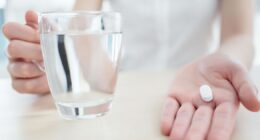Many people turn to dieting as a way to lose weight or generally become healthier. While what we eat is an important factor in both of these, it can be difficult to choose the right diet for you.
But in recent months a specific type of diet has gone viral on social media that promises to provide sustainable weight loss.
Known as the 30:30:30 rule, the health plan itself is not entirely new having first appeared in entrepreneur and lifestyle guru Tim Ferriss’ book, The 4-Hour Body in 2010.
However, it has sparked new attention on TikTok for its simple approach to weight loss. It has also been backed by nutritionist and wellness podcasts Gary Brecka.
Speaking at an event last year, Gary broke down the basics of ‘losing weight’, or what he claimed as ‘losing fat’. He suggested that 30:30:30 is all a person would need to have a sustainable weight loss journey.
So what is the 30:30:30 diet? Part of its appeal is how uncomplicated this diet is.
It involves eating 30 grams of protein during the first 30 minutes of your day before completing 30 minutes of low-intensity exercise.
Unlike some other mainstream diets, which claim to see weight loss results extremely quickly, the 30:30:30 is supposed to encourage a lifestyle change.
It also does not encourage people to cut out important food groups or dramatically lower their calorie intake.
By having a high protein intake for breakfast, the idea is this will be more satiating than a normal breakfast and leave you feeling fuller for longer.
This concept is backed by a study published in the Federation of American Societies for Experimental Biology Journal in 2014.
This found that people who ate 30 grams of protein at breakfast consumed fewer calories at lunch.
Another, published in the American Journal of Clinical Nutrition in 2013, found that overweight or obese teenage girls who ate a high protein breakfast went on to eat a better diet throughout the rest of the day.
It said: “Breakfast led to beneficial alterations in the appetitive, hormonal, and neural signals that control food intake regulation.
“These data suggest that the addition of breakfast, particularly one rich in protein, might be a useful strategy to improve satiety, reduce food motivation and reward, and improve diet quality in overweight or obese teenage girls.”
To achieve a high protein breakfast you could try the following options:
- Scrambled eggs topped with cheese
- A fruit smoothie with protein powder
- Greek yoghurt topped with nuts.
After eating your high protein breakfast, the next step is to complete 30 minutes of exercise, specifically focusing on cardiovascular exercise to get your heart rate up.
This could be going on a walk, a leisurely bike ride, jogging, using a cardio machine, or swimming laps in a pool.
According to one study from 2021 this combination of more protein and cardiovascular exercise resulted in less body fat, lower cholesterol, less inflammation, and improved insulin sensitivity.
However, there are cons to the 30:30:30 diet, the main one being that it may not be compatible with your schedule.
Sophie Medlin, consultant dietitian at City Dietitians, told Healthline: “In my experience, most people’s morning routines involve school runs, rushing around, and generally just about managing to get out of the door on time.
“This means that for the vast majority of people, having 30 minutes in the morning to exercise, as well as the additional time to prepare and plan a high protein breakfast, is unsustainable.”
It is also worth noting that there is no guidance on how to eat or exercise the rest of the day.









